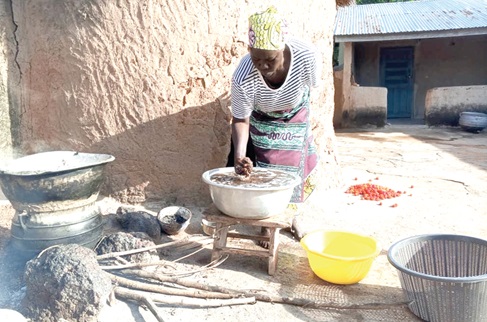
Sacred Wasawasa - Traditional Dagbon delicacy steeped in culture and taboos
Wasawasa is a traditional dish deeply rooted in the culinary traditions of northern Ghana, particularly among the Dagbon people.
Made from dried slices of yam ground into flour and steamed, wasawasa has a unique texture, with the flour rolled into small grains or balls that are enjoyed with various accompaniments.
The dish is often served with spicy sauces, vegetables, shea butter or groundnut oil and paired with fried fish, beans or salad.
It is known for being a simple yet flavourful and nutritious meal, providing carbohydrates, fibre and essential nutrients such as proteins, minerals and antioxidants.
Preparation
The slices of yam are collected and dried thoroughly under the sun until they are completely devoid of any moisture.

A food vendor displaying wasawasa for sale in Tamale
Once dried, the yam slices are ground into a fine powder or flour. Traditionally, this was done using grinding stones or mills but modern-day users may opt for milling machines.
The dried yam flour is then placed in a steaming basket often lined with leaves to prevent sticking. The flour is steamed over boiling water. No stirring is done at this stage and the steam causes the flour to clump and take on a grainy texture similar to couscous or semolina.
After the first steaming, the flour is stirred gently and shaped into small grain-like clumps by hand or using a tool. It is then returned to the steamer for further cooking.
The flour is steamed again until fully cooked, taking on a firm yet fluffy texture. This stage ensures that the meal is properly cooked and ready to eat.
Myths
Wasawasa is more than food as its preparation and consumption are surrounded by intriguing myths and taboos passed down through generations.
According to traditional lore, wasawasa cannot be prepared in an unclean environment.
Cleanliness is seen as very essential to ensuring the dish's quality and spiritual integrity, with practitioners believing that unclean surroundings attract negative energies that affect both the flavour and nutritional value of the food.
One of the more peculiar beliefs is linked to flatulence during preparation. It is said that passing gas during the preparation process spoils the texture and consistency of the dish, reduces its sweetness and flavour and disrupts the spiritual balance of the cooking.
Traditionally, women, during their menstrual cycle, are prohibited from preparing wasawasa. This restriction is rooted in ancient beliefs associating menstruation with impurity and concerns over contamination and spoilage, as well as respect for the sacred nature of the food.
According to folklore, even contact with unclean individuals could contaminate the food, leading to a reduction in quantity and quality.
While many view these taboos as outdated, others see them as essential for preserving the cultural heritage.
Source of income
Sharing her experience with the Daily Graphic, a food vendor, Fatimata Iddi, who has been selling wasawasa for the past 10 years, indicated that it was one of the most difficult traditional foods to prepare as it was time-consuming and required diligence and cleanliness.
"It is true that when a woman is menstruating, she cannot prepare this type of food.
“At first, I thought it was just a myth but now I know it's true because I ever tried cooking it while in my period and it got spoilt. Whenever I am in my menses, my daughter takes over," she said.
She said wasawasa was not just a cultural delicacy, but a source of income for many women, adding that through the business she was able to provide for the family.
Another food vendor, Salamatu Mahami, said wasawasa was very difficult to prepare, yet affordable for everyone.
"With as little as GH¢5, you can enjoy your wasawasa garnished with vegetables," she indicated.
Nutrition
According to Yussif Abdul Wahab, an Assistant Nutritionist at the Karaga District Hospital, wasawasa offers numerous health benefits.
He explained that the dish is rich in carbohydrates, protein, minerals, vitamin K and antioxidants, as well as high fibre content that aids in digestion and helps lower blood sugar levels.
"It is particularly beneficial for diabetic patients as it can help reduce blood sugar levels when consumed," he added.
